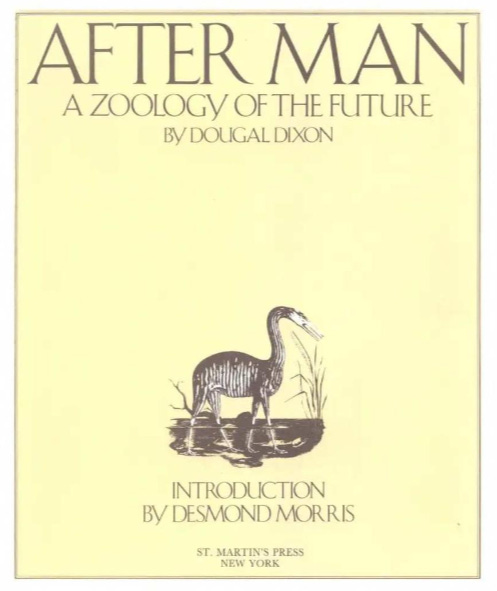closing old tabs on my phone // volume 3
a speculative Japanese documentary; the driveling of IMDBers; Prelude and Fugue in C Major and being a piano freak; a fun tabletop game
This has been a real “what a year, huh…” / “Lemon, it’s February” kind of January. It has truly put my external “laid back” vibe to the test. But fortunately, I’ve seen Nickel Boys and recently rewatched Herzog’s Nosferatu, so my movie depression took an L for a change. We also just finished getting through Survivor: China and Survivor: Micronesia, two unambiguously god-tier seasons of Survivor1, so things are…looking up…?
In any case, here we return to my “Browser Tab Spring Cleaning” with another four tabs raring to be explored and closed at last.
After Man (1990) IMDb page
In 1981, geologist and paleontologist Dougal Dixon published After Man: A Zoology of the Future, a book on speculative evolution that presents a brief explanation of evolution and the history of life on Earth before preceding to present illustrated accounts of possible biological developments some 50 million years after the extinction of the human race. It popularized speculative evolution and led to numerous successive books by Dixon and others. Even for an idiot layman like me it’s fascinating to consider and peruse…you can browse one full edition on Archive dot org but numerous editions with different illustrations and commentary have been published, in many different languages. In particular it really took off in Japan, and eventually a Japanese stop-motion animation film was adapted from Dixon’s book.
This tab has been open so long that when I initially searched for the film adaptation of After Man, it was such an obscurity that only awful editions were accessible from unofficial sources, with no English subtitles. But upon revisiting this tab and Googling around, I found that two years ago an Archive user put one of these crummy versions through an auto transcriber and roughly translated the transcription to English. Admittedly imperfect, with some stretches untranslated, it is, at least, at last, a version of the film with English subtitles.
The film is an absolute delight. Mixtures of stop motion and puppetry bring various creatures to life: furless future pachyderms traverse vast deserts, storing water in their stretching bellies; batlike creatures with fanning floral accents around their heads prey on fooled butterflies. Episodes of speculative biology are accompanied by segments starring Dixon himself, dubbed in Japanese, explaining the contemporary biology that inspires these future creations. The result is something that finds a nice middle ground between standard nature documentary and something more playful and forward-looking—it places the natural world in context with possible futures, and gives possible futures a grounding in our recognizable world.
(And, naturally, there is no shortage of acknowledgment of our environmental impact)
Nothing is Written: a blog examining film, history and the history of film
Somewhere along the line some years ago I stumbled upon Nothing is Written, a blog by the pseudonymous “Groggy Dundee.” It’s generally what you expect from a late 2000s/early 2010s film criticism blogspot—redundant praise for canonical masterworks like The Good the Bad and the Ugly intermingled with pithy anti-Nolan posturing—but there are some interesting time capsule moments, like a January 2010 takedown of Ben Shapiro, who was then writing about film for Breitbart, who Groggy says “reads like the drivelings of a mentally challenged IMDBer.” Of chief interest to me is Groggy’s occasional reference to the IMDb Film General message board, which he and I would have been frequenting around the same time. There are a lot of serendipitous connections between Groggy and myself: we both had movie blogs in the early 2010s, aspired to be film critics until college, work, and regular real-life stuff disrupted that endeavor, and he lives or at least lived in Western Pennsylvania and attended the University of Pittsburgh, where I now make my professional home.
He really dives in on IMDb discourse with a blog post about “subjectivity,” one of the key pet subjects of internet message boards everywhere, let alone Film General, but astonishingly he in particular name drops three major FG players: Rolling_Streetcar, Independent Thought Alarm, and McFlyin. These are individuals who I not only spoke with at length on IMDb, but who I accompanied to off-IMDb private forums where FG lived on past the death of IMDb’s message board system. In fact, Independent Thought Alarm—who we all called ITA—was a mod for a private LOST (2004) message board created when spoilers became too everpresent on the IMDb board for the show, and he invited me along as I got into the show circa-2009. Never let anyone tell you “the internet isn’t real life”—on that LOST message board, I strengthened a friendship with someone whose wedding I attended, who became one of my closest friends, who ended up living with me for some time only a couple years ago. The internet used to mean something!
I so badly want there to be some kind of oral history of the IMDb message boards—I still talk to a fair number of folks I met this way, though because they are among the more sane and normal people who inhabited Film General, a lot of the most deranged content has surely been lost to time.
I’ve kept Groggy’s blog open on my phone precisely because I fear the entirety of this era fading into the ether; I’m glad it lives on in recollections in marginal spaces across the internet. The rest of Groggy’s blog is mostly fascinating by virtue of how utterly familiar it is: big, dogmatic, pompous posturing that only the young can truly stand by; gradual realizations that Life is Happening and writing words about movies on the internet is a lark, a phase; updates years apart for the couple valued readers who bookmarked the blog ages ago and still check in from time to time. It’s a charming, if cringe-inducingly close-to-home, experience browsing through it.
One of the best posts is a “State of the Blog” posted on Christmas 2022 where Groggy talks about how much he’s grown, how he laments the way he used to write and how it was influenced by snarky IMDb posters, and best of all, how he’s been getting into anime. Hell yeah brother.
He has still posted reviews as of August 2024, so Groggy is still with us. It amazes me that we may inhabit the same city, have inhabited the same virtual spaces, how I might have, as a deranged adolescent, insulted his intelligence or wished pain upon his loved ones because he didn’t like The Dark Knight. Glad you’re out there Groggy. Keep fighting the good fight.
Prelude and Fugue in C Major, BWV 846 (Wikipedia)
Who can begin to know why I was looking up Bach’s Prelude and Fugue in C major—I am in a constant state of trying to learn about classical music and always start in a million different places with a million different pieces and never really stick with any one thing or any one direction. But listening to this now, as I write this, I can at least say this is a platonic ideal for music I like.
I can’t pretend to understand how music works nor to be able to fully articulate its mechanics2 but very generally, Bach’s Prelude and Fugue in C major, the very first piece from his larger work The Well-Tempered Clavier, is a progression of chords that shift in harmony and key as the piece goes on. It’s only a few minutes long, and it absolutely rocks.
The first thing that came to mind as I listened to it was the song “Barbarian” by Spencer Krug née Moonface, which contains a gorgeous final third wherein Krug plays a series of cascading piano riffs that fluidly shift in time signature.3 My brain melted the first time I heard that song—the album it’s on, Julia with Blue Jeans On, instantly became one of my favorites of all time and honestly my sensibilities have never been the same. Loving that album unlocked so many future favorites for me, from Nina Simone generally to Kate Bush’s 50 Words for Snow to Erik Satie and my current affinity for ambient music. I am now a piano freak.
I’ve been learning and practicing keyboard lately, starting with goofball “HEY GUYS” piano instructor YouTubers and really basic, easy songs I like such as Sufjan Stevens’ “Flint (For the Unemployed and Underpaid)” or Death Cab’s “Passenger Seat.” It’s been a really fun and satisfying experience, the first time I’ve really dug into learning to play an instrument in a real way since getting a guitar at 14/15. It feels like a game, a puzzle, an exercise, and an art all at once; I highly recommend it if you’ve been considering it.
As for Bach, my assumption is that I had this Wikipedia page open as part of an exploration (not my first) of Clavier, and I think I will spend some time listening to and reading about this work once again; thanks once again to Past Me for the solid recommendation.
MONIKERS instruction manual from Buffalo Games
I’ll close with a recommendation to you from Past Me: Monikers, a very fun card-based tabletop game where you and a partner face off with another pair and try to guess a series of people and things using first full-sentence descriptions, then one word, then charades. I played this with some friends…years ago, now, and had the instructions still open in a tab on my phone. It’s really a blast; it’s got the explosive sudden-recognition satisfaction as something like charades or Pictionary but with the more elaborate process of cultivating a shorthand with your partner over time, gradually figuring out the best ways to describe things in shorter and vaguer terms.
MVPs James and Erik. Someday perhaps I’ll go long on Micronesia’s very mythological miniature arc about Erik and Jason as good and evil twin successors to Ozzy.
Hence looking at the piece’s Wikipedia page, which I recommend if you want an informed explanation of the piece: https://en.wikipedia.org/wiki/Prelude_and_Fugue_in_C_major,_BWV_846












